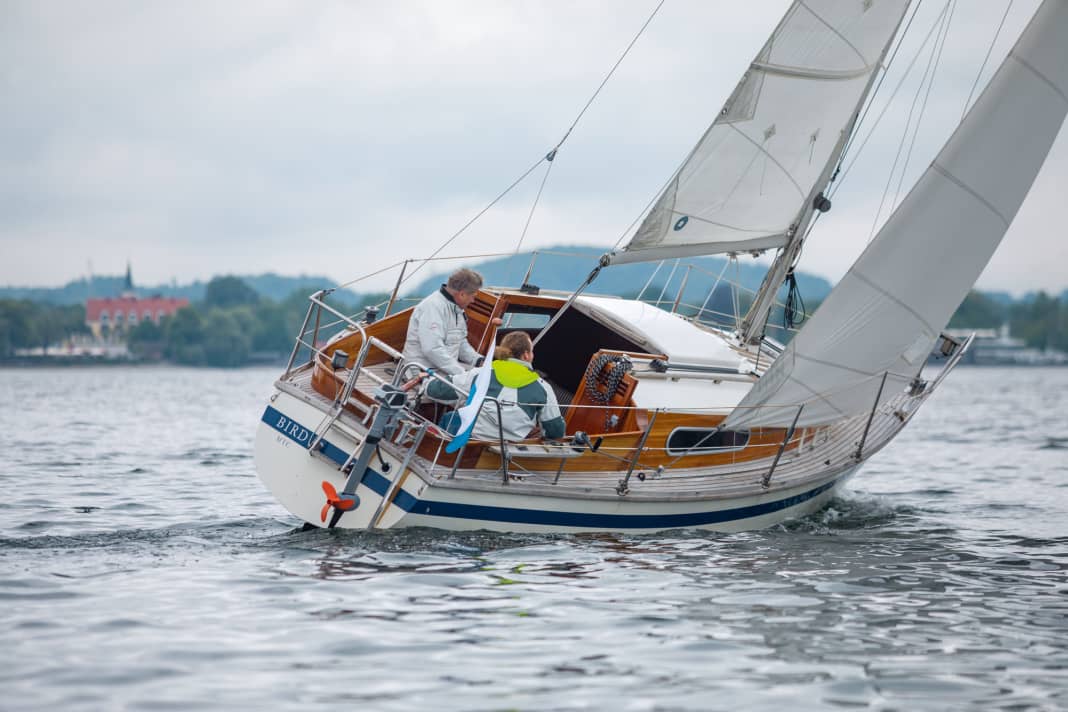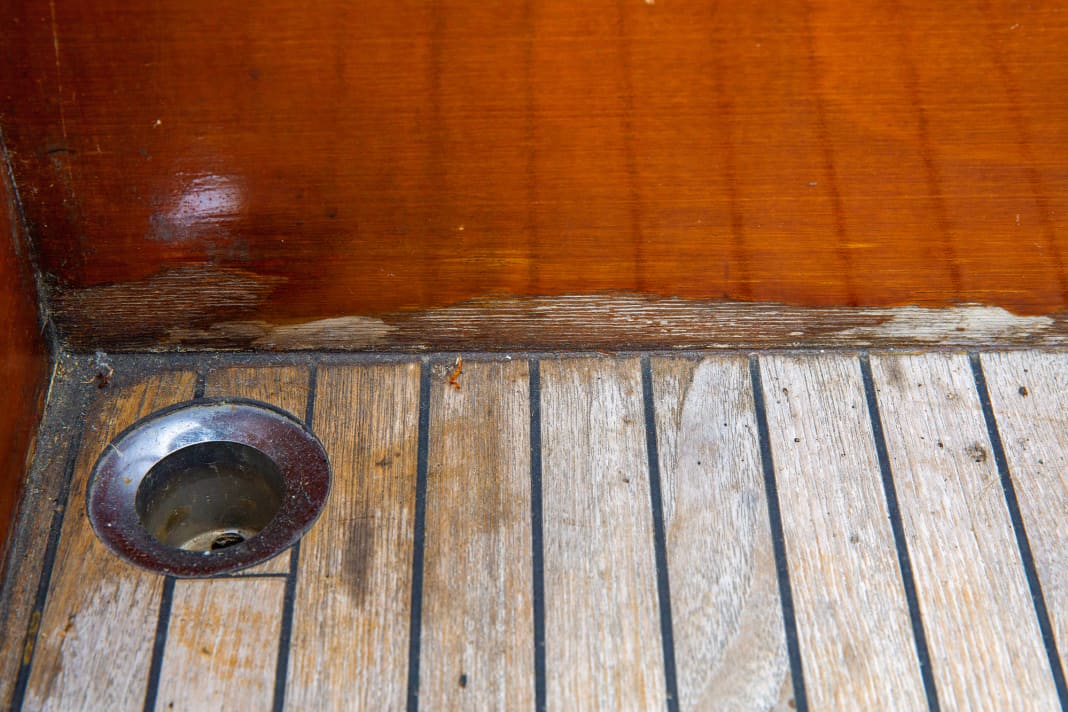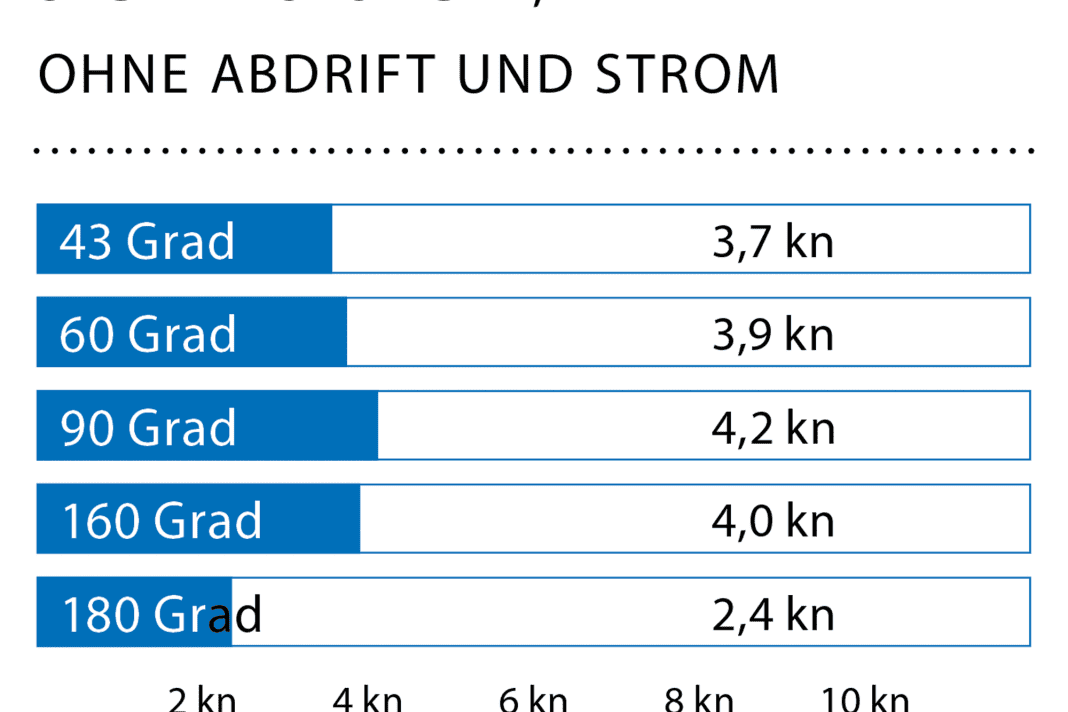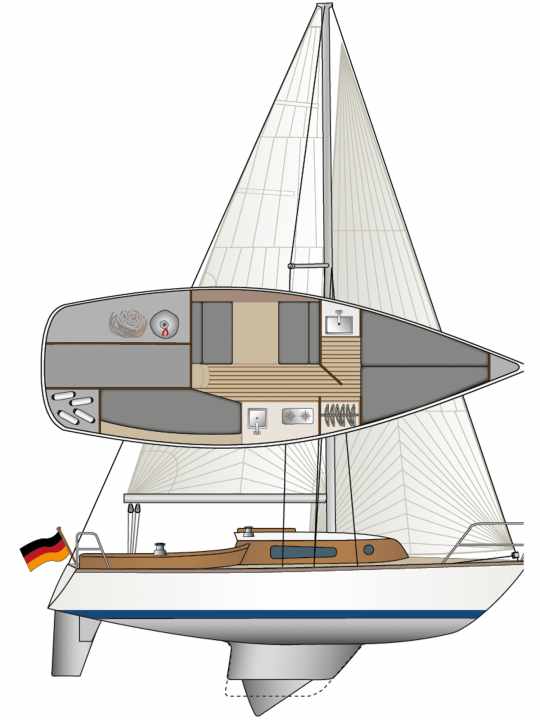





Lake Starnberg is as clear as glass, with only the occasional breeze, and the weather is grey. But the second-hand Biga 24, built in 1988, immediately lifts our spirits: the small cruiser simply looks great! Only the freeboard is made of plastic, all other surfaces are made of wood. The superstructure sits somewhat bulky on the 7.50 metre long hull, but the amount of space below deck is impressive. If you take a seat in the dinette, you feel like you're on a real small yacht.
The shipyard brochure from the seventies praises the boat as unsinkable, self-draining and trailerable. And the YACHT test in issue 21/1976 confirmed that the Biga had sufficient righting moment even when heeled at 90 degrees.
More used boat tests:
After the first inspection below deck, the wind picks up and we cast off from the Munich Yacht Club. A Torqeedo drive with 4 kilowatts of power pushes out of the harbour. The battery is located under a large hatch in the cockpit. There would even be room here for a small built-in engine. However, the outboard motor is more than sufficient to power the boat, which weighs over 1.5 tonnes when loaded.
Contrary to the original configuration, the main halyard is deflected aft so that the sail can be set from the cockpit. The very large 18 square metre genoa is simply unfurled. It is also thanks to her enormous surface area that the Biga makes good progress despite a maximum of 8 knots of unsteady wind and even logs over 4 knots of speed over ground at half wind.
Used boat profile Biga 24
- Type: Biga 24
- Design engineer: Heribert Streuer
- Built: 1975-1999
- Quantity: approx. 480
- New price ready to sail: 24,000 DM
- Used price current: 9.000-19.000 €
Good turning angle
Another nice detail on the headsail: the genoa can almost be sheeted on the superstructure thanks to the jib and shrouds lying far inboard. The fairly tight sheeting enables tacking angles of 85 degrees - a really good value, even though the sails are no longer brand new. In the few smaller gusts of around 10 knots, the Biga 24 initially sails quite flat, but gains stability from 15 degrees and does not heel any further. Except in gusts, where she becomes a little windward, she holds her course, even if you let go of the tiller for a moment. The rudder provides good feedback and the boat is very easy to steer. At 165 centimetres long, the thwarts offer enough space for four people in the cockpit.
The unsteady breeze makes speed measurements difficult; the values are expectedly quite low, measured against the wind they are good. Nevertheless, the potential is noticeable and the boat responds quickly to even small gusts. In the test carried out by our colleagues 45 years ago, it was stated that 5.0 to 5.5 knots were measured in 4 Beaufort winds. The maximum speed recorded at the time was 6 knots.
The fore sheet winches on the coaming on the test boat are already an upgrade, in the old test report only one winch is installed on the riding beam in front of the traveller. The current test boat, on the other hand, has no traveller and the mainsheet is attached directly to the cockpit floor.
Always something to do: Wooden surfaces on the Biga 24





GRP is only visible on the freeboard of the Biga 24. The deck, superstructure and cockpit are wooden surfaces that are very durable if cared for properly. Some areas traditionally require special attention.
Made for more wind
Typical for the Bicker shipyard are the many possibilities to have your boat customised. This is why the used boat market offers a wide range of variants. This also applies to the trailers: keel centreboards with different draughts and a fixed keel version with a draught of 1.20 metres were offered.
The small Biga can definitely take more wind, as shown not only by the old measurements, but also by a look at the workmanship in detail: the jibs are very solidly connected to the hull. There are no cracks in the laminates and the wooden construction also makes a very stable impression, nothing creaks or shows signs of fatigue or rot.
This also applies to the visible areas, which still make a very good impression after 32 years. Only in the cockpit is the paintwork damaged in some places. Even the teak deck still looks fit - no noticeable leaking joints. That would be a problem because there is plywood underneath, which could then absorb moisture. This should be checked carefully when inspecting a used boat, as a new teak deck is very expensive. Apart from a few scratches on the companionway, the varnished surfaces of the mahogany interior are in very good condition. The superstructure is sanded by the owner every two years and given two coats of clear varnish. Minor damage must be repaired quickly, then the maintenance effort is limited.
Below deck of the Biga 24
The dinette on the port side can be converted into a sunbathing area, but at one metre wide it is only large enough for one person. The comfortably sized forward berth offers space for two adults.
Another berth is located on the starboard side in the dog bunk. This has access from the cockpit through the forecastle lid and can therefore also be used very well as storage space. The one metre long superstructure windows allow enough light below deck. However, the huge sliding hatch is spectacular, which when opened almost creates a convertible feeling below deck. This means that the lack of headroom in this area is not a problem in good weather. With 1.65 metres under the main bulkhead, 1.67 in the centre of the saloon and 1.76 under the hatch, many sailors have to tuck their heads under deck.
Originally, a toilet was installed in front of the main bulkhead on the port side, but this was removed because it was not allowed to be used on the lake. A washbasin could be pulled out above it. A clothes rail for life jackets and oilskins is now installed here. Surprisingly, the windows are still tight throughout, the only problem at the moment, according to the owner, is the hatch in the sink. It is above the waterline and is no longer completely tight when in position.
Price then and now
In 1975, the Biga cost 20,903 Deutschmarks; for a ready-to-sail boat - with outboard motor, sails, but without upholstery and lighting - the tester assumed a price of 24,000 Deutschmarks. The owner of the used Biga paid 15,450 euros for his example in 2016. Offers between 9,000 and 19,000 euros can be found on the internet. The boat is still being built as the Biga 242 with a modern underwater hull and 10 centimetres more length.
The measured values for testing the Biga 24




The Biga 24 in detail

Technical data of the Biga 24
- Design engineer: Heribert Streuer
- Torso length: 7,50 m
- Width: 2,50 m
- Draught/catch-up: 1,40/0,85 m
- Weight: 1,35 t
- Ballast/proportion: 0,5 t/37 %
- Mainsail: 12,5 m2
- Furling genoa (115 %): 18,0 m2
- Fock: 12,0 m2
- machine (Torqeedo): 4 kW/5.4 hp
Hull and deck construction
Hull: GRP with polyester resin. Deck/superstructure: classic wooden construction
Price and shipyard
- Base price ex shipyard 1976: 20,903 DM
- Price ready to sail 1976: 24,000 DM
- Price used: 9.000-19.000 €
Status 02/2024
Shipyard
Gerhard Bicker boatyard, Uentroper Straße 33, 59229 Ahlen- Dolberg; www.biga-yachten.de
YACHT review of the Biga 24
The Biga 24 surprises with good sailing characteristics even in light winds. The workmanship is spectacularly good, the mahogany interior is very attractive and easy to use. Everything is on board, even for longer trips
Design and concept
- + Easy-care plastic hull
- + Deck, superstructure and interior fittings with very beautiful woodwork
Sailing performance and trim
- + Very good height in the wind
- + Large sail area for light winds
Living and finishing quality
- + Robust and beautifully finished
- + Very well utilised space
- - No standing height
Equipment and technology
- + Redirected traps retrofitted
- + built-in machine possible
- + Swimming ladder integrated in pushpit
This article first appeared in YACHT 11/2021 and has been updated for the online version.

Michael Rinck
Redakteur Test & Technik

